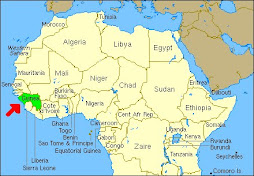Or, hold on to your toes.
My time in Guinea is quickly coming to an end, so I decided to get out and see what all the fuss is about—because Guinea is supposedly a marvelously beautiful country. The fuss was right on—Guinea is pretty nice. Here’s a little summary, and a few photos.
Kankan Is so hot. I do not know how people live there, actually, and am grateful that I do not. Wow. Guineans are tough! It’s the second or third largest city in Guinea and it has no electricity. Would that be like Los Angeles or Chicago with no lights? Any power comes from small privately-owned generators. And no electricity means no fans, means one does not fall asleep until about three in the morning!
I got to see a couple of fellow PCVs in Kankan, one of whom, Darline, does some amazing things with hibiscus. Did you know you can make a nice wine out of that? Darline did! You boil the hibiscus petals in water, throw the resulting juice in a bucket, add sugar and yeast, cover the bucket, and then serve all your friends who come to visit until they can barely walk straight. :) Navigating the city’s streets after a night of hibiscus wine with your equally intoxicated PCV friends and no lights to guide you—always a good time in Kankan! Bonus points for not landing in one of the ditches on the side of Kankan’s nice paved roads. My hat goes off to Darline!
Then, feeling inspired by weather that must have been under 95 degrees (woohoo!) a fellow PCV David and I decided to bike from Kankan to his village. Almost four hours of chit chat and biking later, we arrived
chez lui, an awesome little village called Baro eight kilometers off the paved road, and hometown of our newly-elected president, Alpha Condé. (The town used to be on the national highway, but Condé’s nemesis, then-President Conté, did not like Condé so decided to say a big
booyah by redirecting the national highway so that it no longer passed through Condé’s village. And that is what Guinea’s infrastructure dollars are used for, as opposed to say, electrifying Kankan.)
The biking.

Note that fancy paved road. It's a small part of the national highway, and about the only bit of road like it in the country. I am also aware that my 80-cent Guinean sunglasses make me look a little bug-eyed. Helpful for scaring off small children.
So anyway, David does a lot of work in agriculture, so I biked with him off to a neighboring village where he was demonstrating to some local ladies how to make natural insecticides. (For the curious, you mix the right combo of some certain ground-up leaves, water, peppers, and a little soap, which makes the whole mixture stick to the leaves of the crop that you are trying to protect.)
My friends are seemingly quite adept at preparing toxic brews.
Here, the ladies are grinding up the plants that are to be a part of the insecticide concoction.

At work in the garden.

One guy takes a momentary break in the wheelbarrow.

On the way home from David’s, I had to change bush taxis in Kouroussa. Kouroussa holds a bit of intrigue for me, being the hometown of Camara Laye, one of West Africa’s great authors. (If you want to read about pre-independence Guinea, read
L’Enfant Noir!) As the car passed herds of cute small boys parading to school in their uniforms, I kept imagining little Camara Laye, that age, circa 1937. Kouroussa is not quite as thrilling as I hoped, largely cause I got stuck waiting eight hours for a car, and then took said car for a trip of 85 miles—only six hours on the semi-paved main national highway! (Our road-side stops included one flat tire, at which we all piled out of the car and sat on the shoulder in the moonlight waiting for it to be repaired, two engine checks, one fiddling with the headlights to make sure that those wires stay connected and our headlights keep shining—not necessarily a given among Guinean vehicles—a prayer break, a detour for some lady to drop off a package, and a pee break. Remember, this trip includes thirteen people packed in a station wagon designed for
seven. I am grateful that my bush taxi days will soon be over is all I have to say, and again, hats off to the Guineans who endure this every time they leave their town!)
FoutaBarely after getting back to Dabola, I bust off again, this time to the Fouta Jallon region, also known as Middle Guinea. The best thing about the Fouta is that it’s COLD!! Probably in the steady 80’s, which is a praise-Jesus beautiful temperature range if I ever saw one. The Fouta is thick with the Peuls—the cousins of Cameroon’s Fulbé. One thing I can say about both Upper Guinea (Kankan area) and Middle Guinea (the Fouta) is that I appreciated the clarity of knowing which language to speak. In Upper Guinea it’s always Malinké, and in Middle Guinea it’s always Pulaar (and boy, are the Peuls insistent about your speaking their language! Not knowing Pulaar is hardly an option—they’ll just keep firing away at you in Pulaar until you crumble or stare blankly enough at them that it becomes clear that you do not understand! And then they scoff at you.) But at least it’s none of this guessing that you’re required to do in Dabola, which sits right in the middle of the two regions, where you never know where one is from or what language they speak. Knowing which language to use just to greet someone is really a relief!
In addition to cool air and lots of Peuls, Middle Guinea is known for some beautiful hiking and waterfalls. My friend Christiana, the fellow expat of Dabola, and I were traveling together and we got to splash around in lots of waterfalls, and stand on the edge of many in ways that would never be allowed in America! (Protective barriers are not yet all the rage here.)
This is near the little village of Doucki. (And once upon a time, that shirt was white, back when I bought it in eighth grade.)


The hut where we stayed while hiking.

This is Christiana and our guide going down a waterfall. One thing I learned from this hike is that just because there seems to be no possible pathway, you can still climb on/up/over things and get into places you did not think people were supposed to go! Goats, yes, but humans? I think I achieved new levels of nimble.

We met some wildlife along the hike in the form of a hungry cow.

Then it was time to hike back
up a waterfall! Eek. The crafty villagers in the area had constructed make-shift ladders from bunches of sticks tied together, to facilitate the ascent up the rocky waterfalls. About once a year, they replace the ladders.
Guess whose butt that is:

Here you can see three more of the ladders that make up part of the trail on the left and the waterfall on the right.

I think the coolest thing about this hike is that it would just never happen in America. Rules, regulations and lawsuits probably don’t mix well with home-made stick ladders.
That is a mid-hike, I-am-very-tired face.

Again, villagers taking care of each other—they leave that yellow half of a jug and purple plastic cup on the rocks at all times so it can collect waterfall water and any passers-by can drink it. I should note that while we tourists are paying lots of francs to troop around and get blisters and hike in the waterfalls, the local villagers use this path as a part of their daily life--reminds me how easy we have it in America--no stick ladders required to get to
my grocery store!

Each night after hiking it was bucket baths under the stars, and local rice and sauce for supper. All very lovely although sometimes I do question just how clean I get with a bucket bath. Christiana, however, did not complain of any unpleasant odors. (Thanks, dear!)
Near Labé, we crawled down some more waterfalls, the Chutes de Sala. Unlike bucket baths, playing in waterfalls, akin to frolicking under a high-powered hose, will get you clean!

If you happen to notice my legs in this picture, it is true that I have now lived in Africa/the Tropics for three and a half years and have still not obtained a tan. Now that takes something special.


 What the hell
What the hellI’ll finish this blog entry by mentioning that on this trip I had a couple of interesting and unexpected encounters. The first was while Christiana and I were hiking. Our guide had just pointed out a thick red line of ants crossing the pathway in front of us. I was admiring the ants when I heard a rustle in the bushes just off the path to the right. The rustle turned into a flapping, and the flapping turned into a very hard FWACK against my head! Stunned, I looked as the creature flew off. Christiana had been right behind me and seen it all. “Did that bat just fly into your head?” she asked in her proper British accent. “Was that a bat? Holy shit!” Not only was that a bat, it left a little bat
cadeau too—a nice sticky trail down my arm. Mmmm, bat poop. Wow.
I scared the shit out of a
bat! What are they doing out in the middle of the day anyway??!! No lasting, vampire-esque damage done, however, and my ear stopped ringing from the impact about twenty minutes later.
The next up-close and personal encounter was while Christiana and I were waiting at the car park for a bush taxi out of Labé, heading homeward. She had wandered off in search of a bathroom while I was sitting on a curb in the shade, reading a book. I’d slipped off my sandals and just had my feet resting on top of them. I was enjoying my book when I felt a curious pulling at my big toe. I look up from my book, down at my feet, and see a crazy man bent over, releasing my toe, and smiling up at me as though pulling the white girl’s toe at the car park is just as natural as picking daisies in the spring time. He stands back up again, the transaction complete, and contentedly walks away. I just stare after him, so surprised, and thinking he’ll at least turn around, look at me, maybe thank me for a pleasant toe-pull, but he just moseys off! I can’t help but start laughing! I’m not even sure if anyone else noticed it!
As the hours wore on and we waited for a car, I saw the crazy guy wander around a few more times, and felt myself instinctively pull my feet up under me and my eyes follow him. What was he going to go after next? A bunion? My nose?! All told, we left Labé with no further harassment, but of all the parts of my body that have ever been admired, I believe this was a first for my big toe.
So, just a couple more entries is probably all you’ll here from me! The
Grand Depart from Guinea is next week, with a brief detour in Europe before arriving on terra firma,
aux Etats Unis on May 13!
My love to all! :)






































